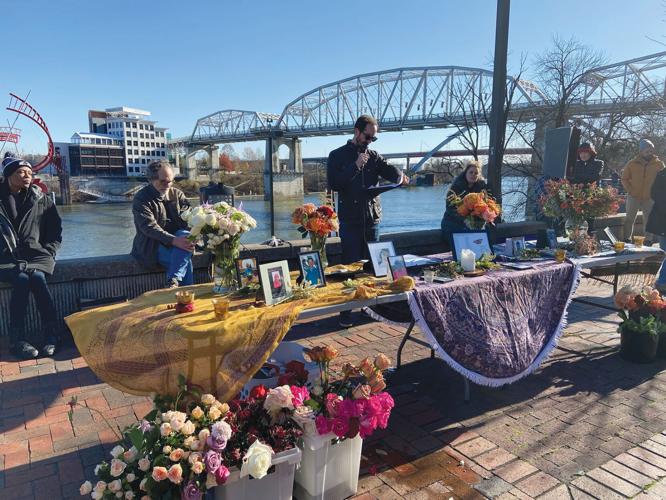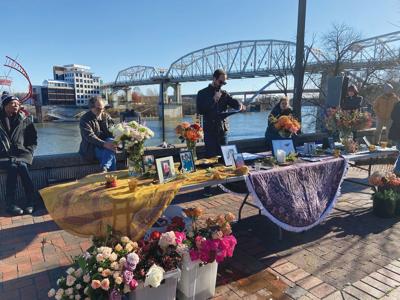At this year’s annual homeless memorial, 176 names were read aloud — 176 names of people who died in Nashville having experienced homelessness.
The homeless memorial, which this year took place Dec. 17, is always held on or near the winter solstice, the longest night of the year. This symbolizes the long nights people experience on the streets. Each year the ceremony centers on the Tara Cole memorial bench at Riverfront Park. In 2006, Cole, who was experiencing homelessness, was sleeping on a dock when two men rolled her into the Cumberland River, where she drowned.
Another unfortunate recurring theme at these events: Acts of violence and pedestrian deaths affect people experiencing homelessness more than the general population, explained Bobby Watts, CEO of the National Health Care for the Homeless Council, which is headquartered in Nashville.
“The first thing we do when we go home is we shut the door, and we lock the door — you don’t have that option [if you are homeless],” Watts told the Scene. “People experiencing homelessness are much more likely to die from violence than to commit violence.”
The median age of those on this year’s list is 54, which falls in line with national averages in life expectancy for those who have been homeless. Nationally, the average life expectancy is around 76. This discrepancy is attributed to elevated rates of disease, including cardiovascular conditions, as well as overdose. Cancer is also more of a risk, as it tends to be diagnosed later in the unhoused population.
“Causes of death are pretty consistent with populations of people that are not experiencing homelessness,” says India Pungarcher, advocacy and outreach specialist with Open Table Nashville. “They’re just dying literally 20 years earlier than someone who’s not experiencing homelessness.”

Nashville's annual homeless memorial, Dec. 17, 2022
Pungarcher is a leader in compiling the list each year, and this year she took on recording medical examiner’s data — a task usually reserved for the Metro Homeless Impact Division. It’s a group effort compiled by Open Table Nashville, Metro Social Services’ indigent burial program, Nashville Rescue Mission, Room In The Inn, Salvation Army and additional outreach workers. While a lack of official tracking from the city can make the list incomplete in terms of cause and date of death, Pungarcher says it can be a strength in other ways. By including outreach workers in data collection, word-of-mouth can catch people who an automated system might miss.
Homelessness has been on the minds of elected officials this year, for better or for worse. Metro officials including Councilmember Freddie O’Connell, Homelessness Planning Council Chair Jaha Martin, and April Calvin with the Metro Homeless Impact Division spoke at the event Saturday. In April, the state legislature passed a bill making camping near or under state highways a misdemeanor, and camping on public property a felony. In October, the Metro Council approved a $50 million plan to address homelessness. In November, Mayor John Cooper’s office announced it would close the encampment at Brookmeade Park by Jan. 1, with the goal of housing every person there.
The number of 2022 deaths is down from last year’s number, 194. Watts said he’s observed a positive long-term impact of using COVID-19 relief funds to temporarily house those experiencing homelessness — though he’s concerned that once those relief funds run out, a housing-first approach will be less possible.
“People say nothing works and the situation is hopeless, but that is not true at all,” Watts said. “Nashville housed more people, they got more people into housing [than in previous years]. The problem is more people are falling out of housing because of the economy of rising rents and other issues.”






